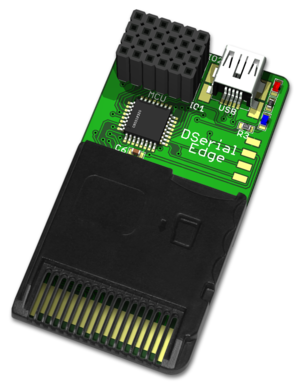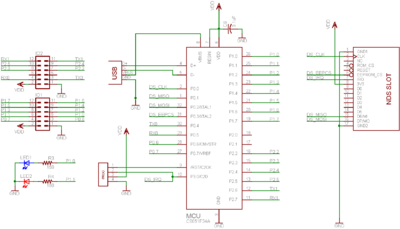Difference between revisions of "DSerial Edge"
(→Troubleshooting) |
|||
| (5 intermediate revisions by 5 users not shown) | |||
| Line 1: | Line 1: | ||
== DSerial Edge == | == DSerial Edge == | ||
| + | [[Image:Dserial-edge.png|thumb|300px|left|DSerial Edge]] | ||
| + | DSerial Edge is an I/O adapter for the Nintendo DS handheld console. It's not compatible with Nintendo DSi. But there is a workaround: "Currently DSerial EDGE won't boot on a DSi but you can use one of the DSi compatible cards to boot and then swap to DSerial." ([http://forums.devkitpro.org/viewtopic.php?p=2564#p2564 source]) | ||
| − | + | For DSerial² information go to [[DSerial2]]. | |
| − | For | + | For original DSerial information go to [[DSerial]]. |
| − | |||
| − | === | + | === Features === |
| − | + | * Complete Slot-1 solution based on [http://www.edge-ds.cn/?lang=en&page=news EDGE] | |
| − | * Complete Slot-1 solution | + | * 18 I/O pins, digital and analog |
* 2 x UARTs | * 2 x UARTs | ||
* 48MHz improved performance with C8051F34A microcontroller | * 48MHz improved performance with C8051F34A microcontroller | ||
* Remote debugging via GDB and devkitARM (to be released) | * Remote debugging via GDB and devkitARM (to be released) | ||
| − | Note: RS232 level converter and accelerometer were removed, since they were under-used on DSerial2. | + | Note: RS232 level converter and accelerometer were removed from older models, since they were under-used on DSerial2. |
| + | |||
| + | |||
| + | |||
| + | |||
| + | |||
| + | |||
| + | |||
| + | |||
| + | |||
| + | |||
== DSerial Edge Software == | == DSerial Edge Software == | ||
| Line 61: | Line 72: | ||
| [[IO|IO2]] || 12 || Second [[IO]] connector, contains UART0 and UART1 | | [[IO|IO2]] || 12 || Second [[IO]] connector, contains UART0 and UART1 | ||
|- | |- | ||
| − | | [[Programming Microcontroller|PROG]] || 4 || [[Programming_Microcontroller|Programming]] connector (initial programming) | + | | [[Programming Microcontroller|PROG]] || 4 || [[Programming_Microcontroller|Programming]] connector (for initial microcontroller programming) |
|- | |- | ||
| − | | [[DS Slot|SLOT]] || 17 || [[DS Slot]] connector | + | | [[DS Slot|DS SLOT]] || 17 || [[DS Slot]] connector |
|} | |} | ||
Latest revision as of 22:43, 9 September 2010
Contents
DSerial Edge
DSerial Edge is an I/O adapter for the Nintendo DS handheld console. It's not compatible with Nintendo DSi. But there is a workaround: "Currently DSerial EDGE won't boot on a DSi but you can use one of the DSi compatible cards to boot and then swap to DSerial." (source)
For DSerial² information go to DSerial2.
For original DSerial information go to DSerial.
Features
- Complete Slot-1 solution based on EDGE
- 18 I/O pins, digital and analog
- 2 x UARTs
- 48MHz improved performance with C8051F34A microcontroller
- Remote debugging via GDB and devkitARM (to be released)
Note: RS232 level converter and accelerometer were removed from older models, since they were under-used on DSerial2.
DSerial Edge Software
Downloads
Go to downloads
DS Programming
Microcontroller Programming (Advanced)
DSerial Edge Hardware
DSerial Edge Components
DSerial Edge uses ICs that require very few external components.
| Symbol | Package | Description |
|---|---|---|
| MCU | LQFP-32 | Silicon Laboratories C8051F34A USB microcontroller |
| LED1, LED2 | 0805 | Status LEDs |
| R3, R4 | 0603 | current-limiting resistors (around 47 Ohm) |
| C6 | 0603 | 0.1uF ceramic capacitor (decoupling cap for MCU) |
DSerial Edge provides the following connectors.
| Symbol | Number of contacts | Description |
|---|---|---|
| USB | 6 | Mini USB connector |
| IO1 | 12 | First IO connector |
| IO2 | 12 | Second IO connector, contains UART0 and UART1 |
| PROG | 4 | Programming connector (for initial microcontroller programming) |
| DS SLOT | 17 | DS Slot connector |
Schematic
Troubleshooting
| Problem | Solution |
|---|---|
| Message "EDGE.DAT tidak menemukan!" appears | Insert a microSD card with EDGE.DAT. If it doesn't help, reseat the microSD card a few times to make sure the contact is good. |
| DSerial Edge is not detected by NDS or works intermittently | Clean the 17 contacts using a toothpick. Make sure that the toothpick is not sharp by cutting off its tip with a knife. There might be some dirt or residue due the manufacturing process. This is a standard maintenance procedure for a slot-based card. |

